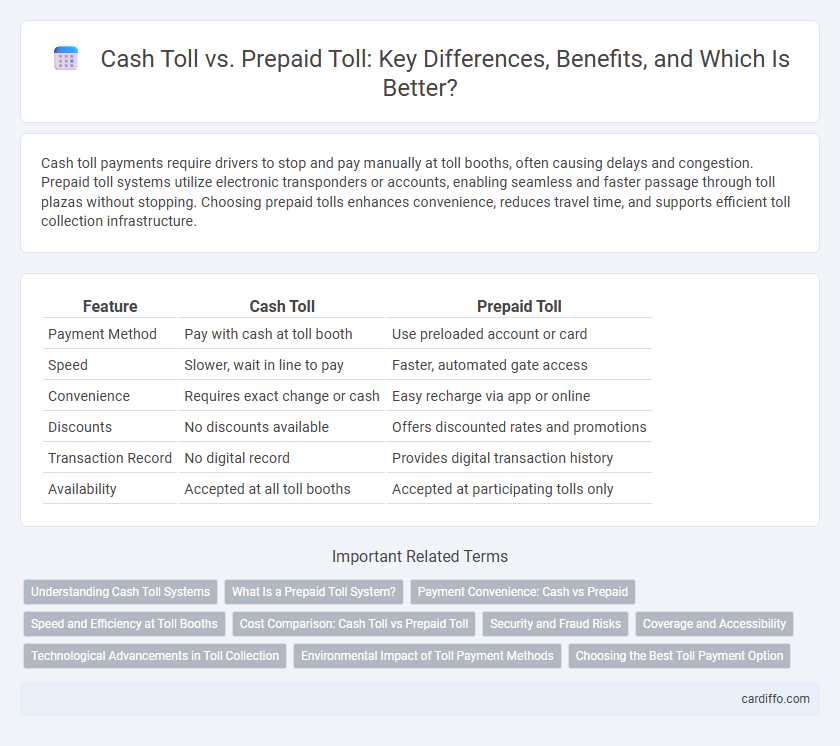Cash toll payments require drivers to stop and pay manually at toll booths, often causing delays and congestion. Prepaid toll systems utilize electronic transponders or accounts, enabling seamless and faster passage through toll plazas without stopping. Choosing prepaid tolls enhances convenience, reduces travel time, and supports efficient toll collection infrastructure.
Table of Comparison
| Feature | Cash Toll | Prepaid Toll |
|---|---|---|
| Payment Method | Pay with cash at toll booth | Use preloaded account or card |
| Speed | Slower, wait in line to pay | Faster, automated gate access |
| Convenience | Requires exact change or cash | Easy recharge via app or online |
| Discounts | No discounts available | Offers discounted rates and promotions |
| Transaction Record | No digital record | Provides digital transaction history |
| Availability | Accepted at all toll booths | Accepted at participating tolls only |
Understanding Cash Toll Systems
Cash toll systems require drivers to pay a fee upon reaching a toll plaza, typically using coins or paper money, which can cause delays during peak hours. Unlike prepaid toll systems that use electronic transponders for automatic payments, cash tolls lack seamless processing and often lead to longer wait times. Understanding these differences helps travelers choose more efficient toll payment options and avoid congestion.
What Is a Prepaid Toll System?
A prepaid toll system allows drivers to pay toll fees in advance by loading funds onto a digital account or toll tag, enabling seamless travel through toll booths without stopping for cash payments. This system reduces traffic congestion and enhances convenience by automatically deducting toll charges as vehicles pass through toll plazas. Many regions implement prepaid tolls via electronic transponders such as E-ZPass, FasTrak, or SunPass, which link to prepaid accounts for efficient toll collection.
Payment Convenience: Cash vs Prepaid
Cash toll payments require drivers to carry exact change and often cause delays at toll booths due to manual transactions, reducing travel efficiency. Prepaid toll systems enable seamless electronic payments through transponders or mobile apps, allowing vehicles to pass without stopping, significantly enhancing payment convenience. The automated nature of prepaid tolls also minimizes cash handling risks and streamlines toll collection infrastructure.
Speed and Efficiency at Toll Booths
Cash toll payments often cause delays and longer wait times at toll booths due to manual handling and change transactions, significantly reducing overall traffic flow efficiency. Prepaid toll systems utilize electronic transponders or RFID technology, enabling swift automatic payment processing as vehicles pass through, minimizing stoppage and congestion. This enhanced speed and efficiency at prepaid toll lanes contribute to smoother traffic management and decreased fuel consumption from idling vehicles.
Cost Comparison: Cash Toll vs Prepaid Toll
Cash tolls typically incur higher fees due to manual processing and slower transaction times, making prepaid tolls a cost-effective alternative with discounted rates and faster passage. Prepaid toll systems reduce operational expenses and congestion, resulting in overall savings for frequent travelers and transport companies. Choosing prepaid tolls can minimize toll expenses by up to 30% compared to cash payments, optimizing travel budgets and reducing time costs.
Security and Fraud Risks
Cash toll payments pose higher security and fraud risks due to the physical handling of money, making them susceptible to theft, counterfeit bills, and human error in change distribution. Prepaid toll systems leverage digital transactions with encryption and account authentication, significantly reducing fraud opportunities and enhancing user data protection. The integration of secure electronic payment gateways and real-time monitoring in prepaid systems ensures faster dispute resolution and minimizes financial losses.
Coverage and Accessibility
Cash tolls offer widespread accessibility at most toll plazas, accommodating drivers who prefer paying on the spot without prior arrangements. Prepaid toll systems provide extensive coverage through electronic transponders and mobile apps, enabling seamless travel across multiple toll roads without stopping. Both methods ensure accessibility, but prepaid tolls enhance convenience and reduce delays on high-traffic routes.
Technological Advancements in Toll Collection
Advancements in electronic toll collection technology have significantly reduced the reliance on cash toll payments, enabling faster and more efficient traffic flow through automated transponder systems and license plate recognition. Prepaid toll systems utilize RFID and mobile payment apps to offer seamless, contactless transactions, improving accuracy and reducing congestion at toll plazas. Integration of GPS-enabled tolling and cloud-based account management further enhances user convenience and supports real-time toll rate adjustments.
Environmental Impact of Toll Payment Methods
Cash toll payments generate significant environmental impact due to increased vehicle idling times at toll booths, leading to higher carbon emissions and air pollution. Prepaid toll systems, such as electronic toll collection (ETC) using RFID or mobile apps, streamline vehicle flow by reducing stop-and-go traffic, thereby lowering fuel consumption and greenhouse gas emissions. Studies show that implementing prepaid toll solutions can cut carbon emissions by up to 30% compared to traditional cash toll collection methods.
Choosing the Best Toll Payment Option
Choosing the best toll payment option depends on travel frequency and convenience preferences. Cash tolls offer flexibility for infrequent users but often result in slower transaction times and potential surcharge fees. Prepaid toll systems like electronic transponders provide faster processing, discounted rates, and seamless travel through toll plazas for regular commuters.
Cash Toll vs Prepaid Toll Infographic

 cardiffo.com
cardiffo.com